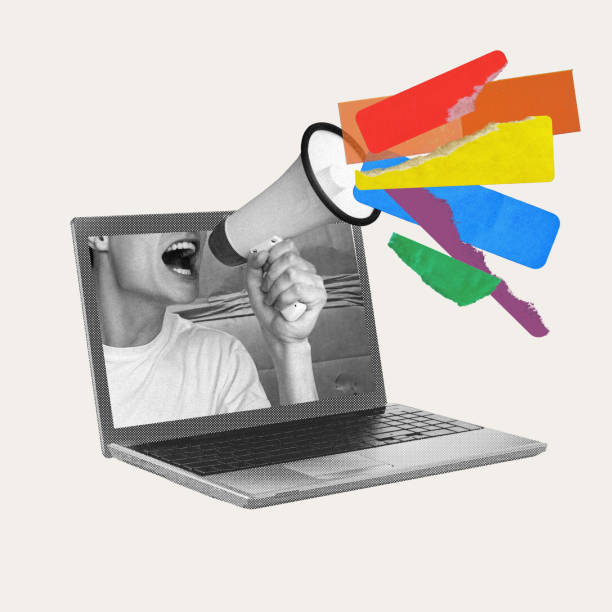In today’s digitally saturated world, where consumers are bombarded with countless advertisements daily, cutting through the noise and capturing their attention has become an increasingly complex challenge. Traditional marketing methods don’t always work because we often ignore them. That’s where influencer marketing comes in. A powerful strategy that leverages the trust and connection individuals have built with their online audiences to promote brands and drive meaningful results.
But what exactly is influencer marketing, and why has it become such a dominant force in the marketing landscape, especially as we navigate the evolving digital terrain of 2025? Let’s delve deeper into this dynamic and impactful approach.
Beyond the Celebrity Endorsement: Understanding the Core of Influencer Marketing
At its heart, influencer marketing isn’t just about paying someone with a large following to hold up your product. It’s a strategic partnership built on authenticity, trust, and shared values. It’s about tapping into established communities and leveraging the credibility of individuals who have cultivated genuine relationships with their followers within a specific niche.
Think of it as a modern-day word-of-mouth marketing, amplified by the reach and engagement capabilities of social media and online platforms. Instead of your friend recommending a great restaurant, it’s a trusted beauty guru sharing their favorite skincare product, or a respected tech reviewer highlighting the features of a new gadget. This personal touch, this sense of direct recommendation from someone the audience feels they “know,” is what sets influencer marketing apart. It bypasses the often-perceived impersonal nature of traditional advertising and fosters a sense of connection and relatability.
The Key Players: Brands, Influencers, and the Audience
The influencer marketing ecosystem thrives on the symbiotic relationship between three key players:
The Brand:
Businesses looking to reach their target audience, build brand awareness, generate leads, drive sales, or enhance their reputation. They seek out influencers whose audience aligns with their ideal customer profile, recognizing that these individuals hold the key to unlocking specific consumer segments.
The Influencer:
Individuals who have built a dedicated following on various online platforms (social media, blogs, YouTube, podcasts, etc.) and possess the ability to influence their audience’s opinions and purchasing decisions within their area of expertise or passion. They are content creators, storytellers, and community builders who have earned the trust and attention of their followers through consistent and engaging content.
The Audience:
The community of individuals who follow and engage with the influencer’s content. They trust the influencer’s recommendations and often look to them for advice and inspiration. This audience is not just a passive recipient of information; they actively participate in discussions, seek opinions, and form a sense of belonging within the influencer’s community.

Why Influencer Marketing Reigns Supreme in 2025:
There are a few big reasons why influencer marketing is still so popular and getting even bigger:
- People Don’t Trust Regular Ads: More and more, we don’t really believe what companies say in their ads. They often feel fake and like they’re just trying to sell us something. But when someone we trust online talks about a product, it feels more real, like a friend telling us about something good.
- Reaching the Right People: Influencers usually focus on specific topics, like eco-friendly living, cooking, video games, or money tips. This means brands can connect directly with the people who are actually interested in what they sell. It’s a much smarter way to advertise than just showing ads to everyone, even if they don’t care.
- Being Real Matters: These days, everyone online tries to look perfect. That’s why we really like influencers who are honest and show their true selves, even the not-so-perfect parts. When they share real experiences and opinions, we connect with them more and trust what they say, which makes their recommendations much more powerful than regular ads.
- People Actually Pay Attention: When influencers post something, their followers often like, comment, share, and save it way more than they do with regular ads. This shows that people are actually interested in what the influencer is saying and are more likely to remember and act on their recommendations.
- It’s Like a Good Review: When an influencer we trust talks about a brand, it’s like getting a thumbs-up from someone we respect. This makes the brand seem more trustworthy and makes us feel better about trying it ourselves. It takes away some of the worry about buying something new.
- It Works Everywhere Online: Influencer marketing isn’t just on one website or app. You see it in short videos on TikTok and Instagram, longer reviews on YouTube, and even in talks on podcasts. This means brands can connect with people in lots of different ways, wherever they like to spend their time online.
Navigating the Landscape: Key Considerations for Effective Influencer Marketing in 2025:
To really make the most of influencer marketing, brands need a solid plan and to pay close attention to the details. Here are important things to think about for 2025:
1. Defining Clear Objectives: What exactly do you hope to get from working with influencers? Do you want more people to know about your brand? Get more potential customers? Sell more stuff directly? Or maybe just make your brand look better to a certain group? Having clear and measurable goals is like having a map – it will guide your plan and help you see if you’re actually succeeding.
2. Find the Right Influencers: This is the most important part. Don’t just pick someone with a lot of followers. Instead, dig deeper and think about things like:
- Do they talk about what you sell? Does their content and audience really match what your brand offers and who you’re trying to reach? If they do, your message will connect with people who are actually interested.
- Do people actually listen to them? How much do their followers interact with their posts? Lots of likes aren’t everything. Look at comments, shares, and saves too. A smaller group that really pays attention is often better than a huge group that doesn’t care.
- Are they real and trustworthy? Does the influencer seem genuine and honest with their audience? Trust is super important. People are more likely to believe someone who seems real.
- Do they fit your brand? Do their values, the way they create content, and their overall online personality match your brand’s image and what you believe in? If they don’t fit, it can feel fake and even hurt your brand.
3. Create Content Together: Don’t just tell the influencer what to say. Work with them! They know their audience best. Let them use their own style to create posts that feel natural and exciting for their followers. Their unique way of talking and telling stories is what makes them connect with people.
4. Be Honest About Partnerships: It’s really important to clearly tell people when a post is sponsored. There are rules about this, and it’s just good practice. Being upfront builds trust with the influencer’s audience and with your brand.
5. Look Beyond Just Likes: Sure, likes and new followers are okay to see, but focus on things that actually help your business. This could be how many people visit your website from the influencer’s page, how many potential customers you got, how many sales came from the influencer, and if people are talking more positively about your brand. Use good tools to track these things and see the real impact of your campaigns.
6. Build Real Connections: Don’t just do one-off projects with influencers. Think about creating long-term partnerships with those who really love your brand and get good results. These “brand ambassadors” can become strong supporters and build even deeper connections with their audience over time.
7. Keep Up with What’s New: The online world and influencer marketing are always changing. New apps and ways of creating content (like those cool AR/VR things) are always popping up. Also, new tech like AI is changing how influencer marketing works. Stay in the know so you can stay ahead of the game and keep your strategies fresh.
What is Influencer Marketing?

To reiterate and provide a concise definition, influencer marketing is a marketing strategy where brands collaborate with individuals (influencers) who have built a significant and engaged audience on various online platforms. These influencers, due to their expertise, personality, or content, hold the power to impact their followers’ opinions and purchasing decisions.
Instead of directly advertising to a broad audience, brands partner with these trusted figures to organically weave their products, services, or brand message into the influencer’s content. This can take various forms, including:
- Sponsored Posts: The influencer creates and shares content (photos, videos, text) that explicitly promotes the brand’s product or service.
- Product Reviews: The influencer provides an honest and authentic review of the brand’s offering.
- Affiliate Marketing: The influencer promotes the brand’s products using unique affiliate links, earning a commission on any sales generated through their link.
- Giveaways and Contests: Collaborating on engaging contests that require audience participation and brand interaction.
- Brand Ambassadorships: Forming long-term partnerships where the influencer consistently represents and promotes the brand.
- Story Mentions and Takeovers: Utilizing ephemeral content formats like Instagram Stories or platform takeovers for real-time engagement.
- Live Streams and Q&A Sessions: Engaging with the audience directly through live video formats, often showcasing or discussing the brand.
The core principle of influencer marketing lies in leveraging the trust and credibility that influencers have established with their audience. When an influencer recommends a product or service, 1 it carries more weight and authenticity than a traditional advertisement because it comes from a source that their followers admire and believe in. This human-to-human connection is what makes influencer marketing such a potent tool in the modern marketing arsenal.
Must Read: The Rise of AI in Digital Marketing in 2025
The Future is Connected:
As the internet keeps changing and getting more complicated, influencer marketing will definitely keep being a really important way to market. The basic idea of connecting with people, being real, and reaching the right audience makes it a must-do for companies that want to build good relationships with their customers and grow in the future. If brands think carefully, work with influencers in a real way, and keep up with what’s new online, they can use the power of these trusted voices to share their message and make lasting connections with the people they want to reach.


